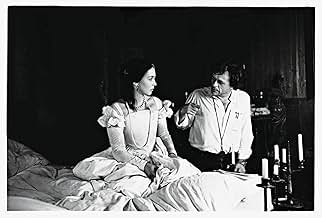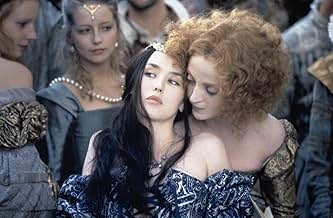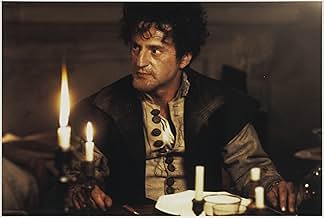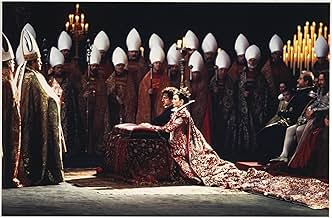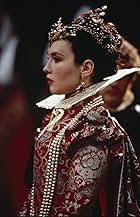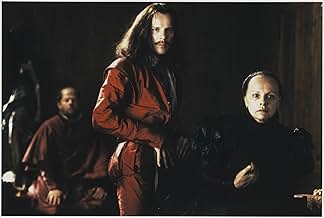Young Queen Margot finds herself trapped in an arranged marriage amidst a religious war between Catholics and Protestants. She hopes to escape with her new lover, but finds herself imprisone... Read allYoung Queen Margot finds herself trapped in an arranged marriage amidst a religious war between Catholics and Protestants. She hopes to escape with her new lover, but finds herself imprisoned by her powerful and ruthless family.Young Queen Margot finds herself trapped in an arranged marriage amidst a religious war between Catholics and Protestants. She hopes to escape with her new lover, but finds herself imprisoned by her powerful and ruthless family.
- Nominated for 1 Oscar
- 9 wins & 16 nominations total
Miguel Bosé
- Guise
- (as Miguel Bosè)
Jean-Philippe Écoffey
- Condé
- (as Jean-Philippe Ecoffey)
Featured reviews
10Johnny B
Alexandre Dumas should certainly be satisfied with this superb adaptation of his classic. The setting is excellent and it gives a wonderful image of 16th century France. Naturally the highlight of the movie is the re-enactment of the St. Bartholomew's Day massacre. The horrendous scenes of the murders in all their crudity are terrific. The actors did a wonderful job here. Isabelle Adjani is, as usual, terrific. Her nude scenes, depicting the queen's adultery, lust and incestuous affairs are acted in such a way that they are a form of art. Vincent Perez is in one of his best roles - his interpretation of La Môle is second only to his acting in "Indochine". The great Virna Lisi is simply marvellous posing as Cathérine de Médicis - no wonder she won the Best Actress Award at Cannes. She is the ambitious woman par excellence, stopping at nothing to get where she wants, not even if she has to see her sons being killed one by one and sell her daughter in a convenient marriage to unite the Catholics and the Protestants. The others, especially Asia Argento, impersonating the tragic countess Charlotte de Sauve did a good job too. A very well deserved Prix du Jury.
The St. Bartholomew's Day Massacre---not exactly a subject the average person knows much about these days. But, a VERY important part of French and European history nonetheless. The history teacher in me will now BRIEFLY take over: Like England, there was a lot of tension between the Protestants (Hugenots) and Catholics during the 16th century. However, unlike Henry VIII's ultimate decision to break from the Catholic Church, the French pretty much wiped out the Hugenots--those who were not killed fled abroad. Up until St. Bart's Day, there had been tension but eventually the king granted religious freedom to all. This was not to last, as a conspiracy was hatched and on St. Bart's Day, thousands of Hugenots were murdered. To commemorate this event, the Pope issued a special medallion and ordered a celebration. Not exactly one of the finer moments in human history.
The movie concerns the machinations leading up to the event as well as portraying the massacre and the after effects. I'm not going to say more, as I don't want to spoil it for the viewer. However, I will say that the writing, acting and pacing of this film were excellent and kept my attention throughout. This fictionalized account of this true-life tragedy is compelling.
The movie concerns the machinations leading up to the event as well as portraying the massacre and the after effects. I'm not going to say more, as I don't want to spoil it for the viewer. However, I will say that the writing, acting and pacing of this film were excellent and kept my attention throughout. This fictionalized account of this true-life tragedy is compelling.
Back in 1994 La Reine Margot' dispensed of every preconceived notion of traditional costume drama, bringing a radical and shocking slant on history. The lavish sets and costumes remained but the atmosphere was now tainted with bloodshed, poison, lust and incest. The regal palaces that were so stereotypically populated by loyal subjects are transformed into a viper's nest of power politics, schemes and deceit where royal heritage counts for little and deviousness is the key to success.
The year is 1572; France is torn apart amidst the conflict between Catholics and Protestants whilst the King is a mere puppet, first to his domineering, Catholic, mother (Catherine de Medici, played with superlative coldness by Virna Lisi) and later to the protestant leader Coligny. In a half hearted effort to bring peace to the land Catherine marries off her daughter Margot (Isabelle Adjani) to the protestant Henri de Navarre (Daniel Auteuil), a political manoeuvre that deludes no one. Margot and Henri are certainly a less than content couple; as they walk down the aisle they engage in a hissing match with one another where Margot succinctly informs him that Just because we're married it doesn't mean I have to sleep with you' and suggests he steer clear of her bedroom. They also fail to adhere to any form of decorum during the wedding reception; whilst Henri brawls with the Catholics (and flirts with a very youthful Asia Argento, of xXx fame) Margot goes window shopping amongst the male guests, looking for a viable one night stand. When the wedding guests prove unsatisfactory she simply dons a mask and takes to the streets, masquerading as a prostitute, and continues her search amongst the hordes of Protestant soldiers, who have gathered for her wedding, eventually settling on the dour La Mole (Vincent Perez). However any illusions of peace are shattered after a botched attempt to assassinate Coligny, as the Catholics, fearing a revolt, slaughter 6,000 Protestants in what becomes known as the St. Bartholomew's Day Massacre.
The sheer horror of the massacre is reproduced with unflinching realism by director Patrick Chireau, who manages not only to shock but also recreate an atmosphere of utter chaos, exemplified by the moment when Margot is wandering amongst the palace corridors which have been besieged by soldiers and are strewn with corpses (Margot is curtly told return to your room and lock the door'). Unfortunately some of the impact of the massacre is lost due to the fact that we know barely any of the characters who are being murdered and it begs credibility that the Protestants seemingly put up no resistance. One of the few survivors of the slaughter is La Mole, who is saved by Margot when he breaks into her chamber, looking for sanctuary, which Margot freely gives to him (and more). In the aftermath of the massacre Margot also manages to save Henri de Navarre, forging a valuable alliance in the process. However, suspicion has been aroused that she is a traitor and she finds that she is in a decidedly vulnerable position where her only hope of freedom is to flee to Navarre with Henri.
Isabelle Adjani, France's premier actress, delivers one of her finest performances as the stubborn and promiscuous Margot, who despite initially coming across as vain and conceited later earns our sympathy as she finds herself in an impossible situation, where her position in the royal family is of little consequence (her brothers love her in a perversely incestuous way and her mother sees her as an inconvenience and potential threat to her authority) and the threat of assassination always looms around the corner. Whilst the political manoeuvrings and power struggles are intriguing the same cannot be said for the tepid romance between Adjani and Perez. The pair lacks any chemistry; even their scenes of erotic passion come across as frigid and awkward. They make an attractive couple, but not a particularly convincing one.
La Reine Margot is also one of the most visually sumptuous films ever released; the big budget clearly didn't go to waste in recreating the gothic decadence of the period and the costumes were deservingly nominated for an Oscar. It's easy to view La Reine Margot' as a precursor to the acclaimed 1998 film Elizabeth', as both centre around a female historical figure who has to endure the conflict between Catholics and Protestants whilst surviving assassination attempts (usually via poison) and overcome tragedy as those who they care for are systematically murdered. Indeed if nothing else La Reine Margot' provides a chilling insight into one of history's most horrific atrocities and offers an unsettling portrait of the moral bankruptcy that pervaded throughout 16th century society.
My Score: 8 out of 10
The year is 1572; France is torn apart amidst the conflict between Catholics and Protestants whilst the King is a mere puppet, first to his domineering, Catholic, mother (Catherine de Medici, played with superlative coldness by Virna Lisi) and later to the protestant leader Coligny. In a half hearted effort to bring peace to the land Catherine marries off her daughter Margot (Isabelle Adjani) to the protestant Henri de Navarre (Daniel Auteuil), a political manoeuvre that deludes no one. Margot and Henri are certainly a less than content couple; as they walk down the aisle they engage in a hissing match with one another where Margot succinctly informs him that Just because we're married it doesn't mean I have to sleep with you' and suggests he steer clear of her bedroom. They also fail to adhere to any form of decorum during the wedding reception; whilst Henri brawls with the Catholics (and flirts with a very youthful Asia Argento, of xXx fame) Margot goes window shopping amongst the male guests, looking for a viable one night stand. When the wedding guests prove unsatisfactory she simply dons a mask and takes to the streets, masquerading as a prostitute, and continues her search amongst the hordes of Protestant soldiers, who have gathered for her wedding, eventually settling on the dour La Mole (Vincent Perez). However any illusions of peace are shattered after a botched attempt to assassinate Coligny, as the Catholics, fearing a revolt, slaughter 6,000 Protestants in what becomes known as the St. Bartholomew's Day Massacre.
The sheer horror of the massacre is reproduced with unflinching realism by director Patrick Chireau, who manages not only to shock but also recreate an atmosphere of utter chaos, exemplified by the moment when Margot is wandering amongst the palace corridors which have been besieged by soldiers and are strewn with corpses (Margot is curtly told return to your room and lock the door'). Unfortunately some of the impact of the massacre is lost due to the fact that we know barely any of the characters who are being murdered and it begs credibility that the Protestants seemingly put up no resistance. One of the few survivors of the slaughter is La Mole, who is saved by Margot when he breaks into her chamber, looking for sanctuary, which Margot freely gives to him (and more). In the aftermath of the massacre Margot also manages to save Henri de Navarre, forging a valuable alliance in the process. However, suspicion has been aroused that she is a traitor and she finds that she is in a decidedly vulnerable position where her only hope of freedom is to flee to Navarre with Henri.
Isabelle Adjani, France's premier actress, delivers one of her finest performances as the stubborn and promiscuous Margot, who despite initially coming across as vain and conceited later earns our sympathy as she finds herself in an impossible situation, where her position in the royal family is of little consequence (her brothers love her in a perversely incestuous way and her mother sees her as an inconvenience and potential threat to her authority) and the threat of assassination always looms around the corner. Whilst the political manoeuvrings and power struggles are intriguing the same cannot be said for the tepid romance between Adjani and Perez. The pair lacks any chemistry; even their scenes of erotic passion come across as frigid and awkward. They make an attractive couple, but not a particularly convincing one.
La Reine Margot is also one of the most visually sumptuous films ever released; the big budget clearly didn't go to waste in recreating the gothic decadence of the period and the costumes were deservingly nominated for an Oscar. It's easy to view La Reine Margot' as a precursor to the acclaimed 1998 film Elizabeth', as both centre around a female historical figure who has to endure the conflict between Catholics and Protestants whilst surviving assassination attempts (usually via poison) and overcome tragedy as those who they care for are systematically murdered. Indeed if nothing else La Reine Margot' provides a chilling insight into one of history's most horrific atrocities and offers an unsettling portrait of the moral bankruptcy that pervaded throughout 16th century society.
My Score: 8 out of 10
This is not flawless filmmaking, but it IS flawless cinema. One won't bother recounting the story, or the plotline, a viewer can gather that from history, OR previous reviews, OR even a casual overview of Dumas novels. One would like to speak to the filmmaking here, and along the way, on the movie.
If one is at all interested in French history, one has already seen this movie a thousand* times, * meaning enough. However, a digital dvd transfer of the movie as it was originally intended to be seen by M. Chéreau, without subtitles, without interference,the VO [version originale] is stunning. The first and foremost difference is the lighting - il te frappe, as the French would say, "it strikes you." Not being a technician, one can't speak to the difference between the film one saw on DVD and the film one saw in American theaters, or on American DVD, or even on VHS, French and/or American. The difference is striking. From the opening scenes, one is suddenly, almost frightfully, drawn into the 16th century, an epoch without the cushions of modern life. The light is everywhere, and it shines in a way that is pitiless and revelatory. This was never, unfortunately, appparent to theater goers here, and, I suspect, to cinema goers in France. If it had been, there would have been Oscars. One is not sure cinema projection equipment can convey what M. Chéreau did with this film. Where there is light, there is "liminality" and where there are shadows, even there there is light, but it is dim (thus not liminal), and the cadaverous flesh of the living players conveys more than anyone could ever say in dialogue - these are "dead" people, living out a drama that is already predestined for them, which is a marvelously conceived conceit of the filmmaker. M. Chéreau is playing with predestination and Fate here, and it is through the art of cinema that he is doing it. Mlle Adjani turns in a bravura performance, and it is only by grace of Jeanne Moreau's 1954 performance that we have any scale of comparison. Moreau's performance is cool, ice and politics, but Adjani's is heat, love and politics, and suited to her generation. Vincent Perez is suitably heroic (watch the rose tones come and go on his flesh as the light changes). The kudos for male performances, however, are shared by Jean-Hugues Anglade, long an underrated French actor, and Daniel Auteuil, too long appreciated for his bravura performances elsewhere and not given enough credit for what he can do with a gesture, with a line, with a look. M. Auteuil is almost always lit with cool hypocrisy, (ambers and greens) as suits his performance, but M. Anglade turns in one of the best roles of his career as the doomed Charles IX, and he never looks less than "on death's door." A naturally sensitive actor, he adds a touch of "soullessness" to his Charles IX that is unforgettable - weak, yes, king, yes, momma's boy, yes, but also, in the end, needy child. It is stunning in its ultimate simplicity as a performance for cinema. Very few performances in film measure up to Virna Lisi's Catherine de Medici(s) [the s is French spelling]. She is "incroyable" (incredible), and something was wrong when she wasn't recognized universally as '94's best supporting actress. Her queen is multi-layered, loving, hating, deeply cynical yet naively superstitious, playing son against son and daughter against political reality, in other words a perfect incarnation of the 16th century in France. Any political woman you can think of could have sat at her feet and learned lessons on "how to do it." Mme Lisi herself might have been a confidante to the real Catherine, she is that good in this role. She was crowned for this performance in Europe, but should have been crowned universally. Watch her as she vacillates between love and hate and politics, and especially watch the lighting - it subtly changes according to her role of the moment. Watch her carefully towards the end, as Fate winds things up, and watch an actress give herself up totally to the role, to the moment, in order to incarnate a character that is absolutely unforgettable.
Apparently, M. Chéreau lets his actors know what he is doing, because they respond in according " shades" of emotion. When the lighting is dim, or the focus is midrange, they "fuzz" a little, giving the viewer a sense of their uncertainty, but if he focuses, they focus, too, and there are frightening moments of soul-baring intimacy when you almost want to look away - it is like watching your intimates make love; too much, too intimate, too deep. Dominique Blanc turns in a nearly flawless performance as the over-the-top lady-in-waiting to Margot - watch her lighting, too, and how she responds. "Conspiratrice", duchesse, cynical woman in love despite herself, she is very, very good. Pascal Greggory as the future Henri III is wonderful, and the rest of the cast stand out. This was obviously a labor of love and intensity, and all gave their best to M. Chéreau.
In the end, one keeps wondering what it is about the film that was so memorable - and the french dvd transfer makes it perfectly clear. The performances, yes; the "mise en scène," yes; the director, certainly. But it is the whole, the light and the shadows, the darkness and the glow, as in those candles in the marvelous square paper lanterns in the late night of the Louvre as the people begin to weave their plots, that make it memorable. Good actors, great performances, and a sure director - flawless cinema.
If one is at all interested in French history, one has already seen this movie a thousand* times, * meaning enough. However, a digital dvd transfer of the movie as it was originally intended to be seen by M. Chéreau, without subtitles, without interference,the VO [version originale] is stunning. The first and foremost difference is the lighting - il te frappe, as the French would say, "it strikes you." Not being a technician, one can't speak to the difference between the film one saw on DVD and the film one saw in American theaters, or on American DVD, or even on VHS, French and/or American. The difference is striking. From the opening scenes, one is suddenly, almost frightfully, drawn into the 16th century, an epoch without the cushions of modern life. The light is everywhere, and it shines in a way that is pitiless and revelatory. This was never, unfortunately, appparent to theater goers here, and, I suspect, to cinema goers in France. If it had been, there would have been Oscars. One is not sure cinema projection equipment can convey what M. Chéreau did with this film. Where there is light, there is "liminality" and where there are shadows, even there there is light, but it is dim (thus not liminal), and the cadaverous flesh of the living players conveys more than anyone could ever say in dialogue - these are "dead" people, living out a drama that is already predestined for them, which is a marvelously conceived conceit of the filmmaker. M. Chéreau is playing with predestination and Fate here, and it is through the art of cinema that he is doing it. Mlle Adjani turns in a bravura performance, and it is only by grace of Jeanne Moreau's 1954 performance that we have any scale of comparison. Moreau's performance is cool, ice and politics, but Adjani's is heat, love and politics, and suited to her generation. Vincent Perez is suitably heroic (watch the rose tones come and go on his flesh as the light changes). The kudos for male performances, however, are shared by Jean-Hugues Anglade, long an underrated French actor, and Daniel Auteuil, too long appreciated for his bravura performances elsewhere and not given enough credit for what he can do with a gesture, with a line, with a look. M. Auteuil is almost always lit with cool hypocrisy, (ambers and greens) as suits his performance, but M. Anglade turns in one of the best roles of his career as the doomed Charles IX, and he never looks less than "on death's door." A naturally sensitive actor, he adds a touch of "soullessness" to his Charles IX that is unforgettable - weak, yes, king, yes, momma's boy, yes, but also, in the end, needy child. It is stunning in its ultimate simplicity as a performance for cinema. Very few performances in film measure up to Virna Lisi's Catherine de Medici(s) [the s is French spelling]. She is "incroyable" (incredible), and something was wrong when she wasn't recognized universally as '94's best supporting actress. Her queen is multi-layered, loving, hating, deeply cynical yet naively superstitious, playing son against son and daughter against political reality, in other words a perfect incarnation of the 16th century in France. Any political woman you can think of could have sat at her feet and learned lessons on "how to do it." Mme Lisi herself might have been a confidante to the real Catherine, she is that good in this role. She was crowned for this performance in Europe, but should have been crowned universally. Watch her as she vacillates between love and hate and politics, and especially watch the lighting - it subtly changes according to her role of the moment. Watch her carefully towards the end, as Fate winds things up, and watch an actress give herself up totally to the role, to the moment, in order to incarnate a character that is absolutely unforgettable.
Apparently, M. Chéreau lets his actors know what he is doing, because they respond in according " shades" of emotion. When the lighting is dim, or the focus is midrange, they "fuzz" a little, giving the viewer a sense of their uncertainty, but if he focuses, they focus, too, and there are frightening moments of soul-baring intimacy when you almost want to look away - it is like watching your intimates make love; too much, too intimate, too deep. Dominique Blanc turns in a nearly flawless performance as the over-the-top lady-in-waiting to Margot - watch her lighting, too, and how she responds. "Conspiratrice", duchesse, cynical woman in love despite herself, she is very, very good. Pascal Greggory as the future Henri III is wonderful, and the rest of the cast stand out. This was obviously a labor of love and intensity, and all gave their best to M. Chéreau.
In the end, one keeps wondering what it is about the film that was so memorable - and the french dvd transfer makes it perfectly clear. The performances, yes; the "mise en scène," yes; the director, certainly. But it is the whole, the light and the shadows, the darkness and the glow, as in those candles in the marvelous square paper lanterns in the late night of the Louvre as the people begin to weave their plots, that make it memorable. Good actors, great performances, and a sure director - flawless cinema.
For the American people that have seen this excellent French movie, I will say just one thing: in many countries around the world we get to see movies from abroad with subtitles. Most of the movies that we see in South American countries come either from North America or Europe and we don't usually complain about the subtitles. Only kids movies are dubbed in Spanish. A great part of the romance or charm about French movies comes from the fact that they are actually spoken in French. Nobody in these films expects the rest of the world to understand as they speak but to make a little effort and appreciate the beauty in each language is something I think is missing in American culture. I've seen nothing but comments on how difficult it was for some members of the American public to understand this film. I only ask myself: in times of globalization, isn't it interesting to learn from people from other parts of the world in their own language, specially a French film based on a French novel by the French Alexandre Dumas, placed in the 16th century, directed by one of France's best directors and acted by some of the most wonderful French actors and actresses of the last decades? Would you want to see this film in English? Sorry, but I think you would be missing a great deal of the depth and emotion of this unique film!!!
Did you know
- TriviaPatrice Chéreau edited the original cut of the film (roughly 160 minutes) to a shorter 138 minutes for international release. This was due to the disappointing box-office performance in France and the criticism (by, among others, Variety critic Todd McCarthy) of the film as being too violent and often incoherent. The French press were scathing of this 'American censorship' (they described the film as having been 'given a face-lift' for American audiences), but the new version was defended by various French critics being both more coherent whilst also maintaining Chereau's artistic vision. The shorter cut was later released in France too, in the hopes of increasing the film's box-office takings. 20 years later, Chereau slightly re-edited his film again and re-mastered it for a new BluRay release with a running time of 161 minutes. This was one of Chereau's last completed acts before his untimely death, so it can be regarded as the definitive version.
- GoofsLa Mole is shot in the legs and the wounds and bloodstains are visible as he goes to execution. But when Margot views his semi-naked corpse, his legs are unmarked.
- Quotes
Charles IX: One who gives life is no longer a mother once she takes that life back.
- ConnectionsFeatured in The 52nd Annual Golden Globe Awards (1995)
Details
Box office
- Budget
- DEM 42,000,000 (estimated)
- Gross US & Canada
- $1,304,237
- Opening weekend US & Canada
- $4,985
- May 11, 2014
- Gross worldwide
- $1,318,578
Contribute to this page
Suggest an edit or add missing content


